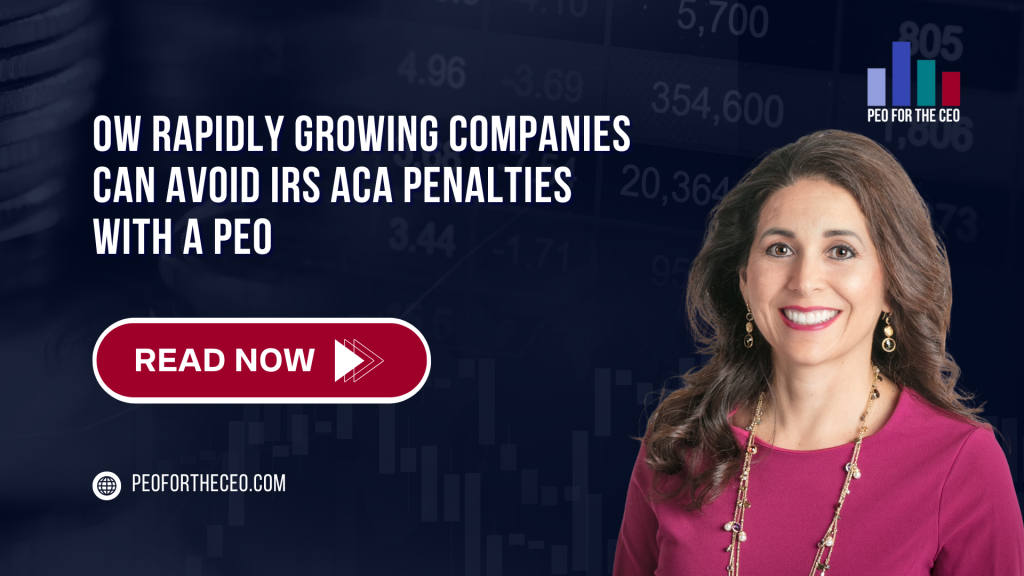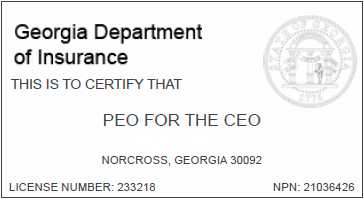How Rapidly Growing Companies Can Avoid IRS ACA Penalties with a PEO

Scaling Beyond 50 Employees? Here’s Why You Need to Pay Attention to ACA Compliance
Many businesses grow rapidly and cross the
50-employee threshold, officially becoming an
Applicable Large Employer (ALE) under the
Affordable Care Act (ACA). While this growth is exciting, it also introduces new compliance responsibilities. If you fail to offer
Affordable ACA-compliant health insurance to at least
95% of full-time employees, your company could face
IRS penalties via Letter 226J —which can amount to
hundreds of thousands of dollars.
The IRS typically
audits ACA compliance 12-36 months after filing, and many employers
don’t realize they’re out of compliance until they receive a penalty notice. The good news?
Partnering with a Professional Employer Organization (PEO) can keep your business compliant,
reduce risk, and ensure proper ACA filings.
Why the IRS Issues Letter 226J: Understanding the Penalties
When an employer fails to comply with ACA requirements, they may be subject to the following penalties:
1. 4980H(a) Penalty – Failure to Offer Minimum Essential Coverage (MEC)
- Applies if you did not offer health insurance to at least 95% of full-time employees.
- 2024 Penalty: $2,970 per full-time employee (minus the first 30 employees).
- Example: A company with 100 full-time employees that didn’t offer MEC could face a penalty of $207,900 per year.
2. 4980H(b) Penalty – Unaffordable or Non-Compliant Coverage
- Applies if the offered coverage wasn’t affordable or didn’t meet minimum value standards.
- 2024 Penalty: $4,460 per employee who receives a subsidy through the Marketplace.
- Example: If 20 employees receive a Premium Tax Credit (PTC) because the employer’s coverage was too expensive, the penalty would be $89,200 per year.
Additional Risks:
- The IRS may assess multiple years of penalties at once, leading to a hefty financial burden.
- Employees receiving marketplace subsidies may have to pay back money if they were incorrectly classified.
- Failure to respond to Letter 226J could result in automatic penalties being enforced.
How a PEO Protects Your Business from IRS ACA Penalties
A
PEO (Professional Employer Organization) is a
turnkey solution to ensure ACA compliance
without additional administrative burden. Here’s how a PEO helps:
✅
Provides ACA-Compliant Health Plans – Ensures your employees have access to
affordable, minimum essential coverage (MEC) to avoid IRS penalties.
✅
Handles All ACA Reporting (Forms 1094-C & 1095-C) – The PEO
files required IRS forms on your behalf, eliminating the risk of reporting errors.
✅
Documents Employee Waivers – If an employee declines coverage, the PEO
obtains a signed waiver, protecting you from liability.
✅
Ensures Affordability Compliance – The PEO ensures that health plans meet IRS affordability
(not exceeding 9.12% of income for 2023).
✅
Reduces Administrative Work – Instead of tracking and managing compliance yourself, a PEO
takes care of everything.
Next Steps: Avoid Risk & Stay Compliant
If your company has
scaled beyond 50 employees and you
haven’t formally documented your ACA compliance, now is the time to act. A
PEO ensures that you are compliant, handles all filings, and gives you peace of mind —so you can focus on growing your business instead of worrying about IRS penalties.
📩 Contact us today
to discuss how a PEO can help your business stay compliant and avoid costly ACA penalties.
About Suzanna Martinez
Suzanna Martinez is the founder of PEO For The CEO, bringing
20+ years of experience working for multiple PEO companies.
She has guided hundreds of businesses in Georgia and Colorado
to streamlined HR operations and significant cost savings.
Suzanna specializes in negotiating large-group health insurance
rates and matching businesses with the right PEO partner.


